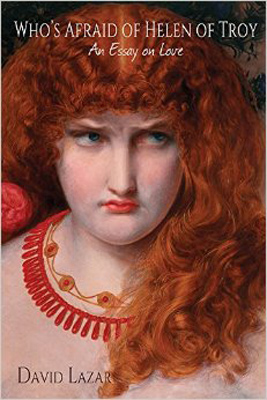Who’s Afraid of Helen of Troy
Check out your favorite bookstore in May. That’s when Who’s Afraid of Helen of Troy: An Essay on Love by David Lazar will be available, and it’s one fun book. Though it’s subtitled an essay, his ninth book is written in a series of short prose poems that mesh bits of autobiography with strong portions of mythology and dreams, accented with songs and movies. Check out your favorite bookstore in May. That’s when Who’s Afraid of Helen of Troy: An Essay on Love by David Lazar will be available, and it’s one fun book. Though it’s subtitled an essay, his ninth book is written in a series of short prose poems that mesh bits of autobiography with strong portions of mythology and dreams, accented with songs and movies.
Even if you’re not familiar with Homer and his peers, you’ll still enjoy the surprise of Lazar’s words. “Narcissus” is a good example with these lines: “Here in the city, I only exist after it rains. // I start looking for myself when the thunder begins, a head start, eyes down. // [ . . . ] As much as I deserve to love myself, only I am capable of spitting in my own face.”
“Deal” offers more of Lazar’s style:
In my dreams Aphrodite deals. The stakes are high, but I’ve got a good stash. I
think we’re playing five card stud, but Hera says when you cut, the boys will lose
their tails and I have nothing up my sleeves but little golden swallows peeking
out of the edges of my fingertips. [ . . . ] Your face
appears in the center of the table, like Auntie Em in the Witch’s crystal ball.
Reviewing Who’s Afraid of Helen of Troy sent me to my bookshelves for a refresher in the classics. Several times, I interrupted the flow of the essay because I was so curious to find out more about the characters to fit them into context.
Most everyone has a passing knowledge of Helen of Troy and a few other mythological characters. But in Lazar’s poem “My Saranyu,” I couldn’t find the title character in any of my reference books. Wikipedia steered me to Surya, her husband. That led me back to the books where, in one instance, Surya’s wife was called Uṣas, though in some accounts she’s listed as his mother or mistress. That aside, by several consensuses, Saranyu was the Hindu goddess of clouds or dawn. As you can see, her identity seems rather nebulous. Lazar introduces her to us this way:
Saranyu can’t look in a mirror anymore. Wild horses couldn’t make her. Truth
is, the changeling had a face like Helen, but the soul of the echoing caves of
the Anathagri Hills. Splitting in two wasn’t fun anymore. Each time she bent
over, bent down to smell the rich earth, the seeds seemed to curdle in her mind.
Now what about those tongue-twisty names you’ll run into? Try this one, for example: “Mnemosyne,” which is the title of one of Lazar’s poems. In Greek mythology she personified memory:
[ . . . ] Mnemosyne
remembered when the tin ceilings were so layered with Christmas lights that
you thought you were in the movie you always wanted to dream of a childhood
dollhouse cantina. Who could say such things and not expect you to smoke?
My favorite musical reference in the book is a Johnny Mercer song, Something’s Gotta Give, interspersed in italics with Lazar’s lines in “Andromache,” who was the wife of Hector, an interesting juxtaposition:
The body of Hector, a thing, the beloved, love, now a thing, to be carried from
the wall of Troy.
So, en garde, who knows what the fates might have in store?
From their vast mysterious sky?
In Who’s Afraid of Helen of Troy, Lazar’s commingling of contemporary with the ancients makes for a clever, delightful book. Though my curiosity led me to get sidetracked now and then, research is not necessary to be entertained by this volume. It’s worth your attention. Look for it in May.





